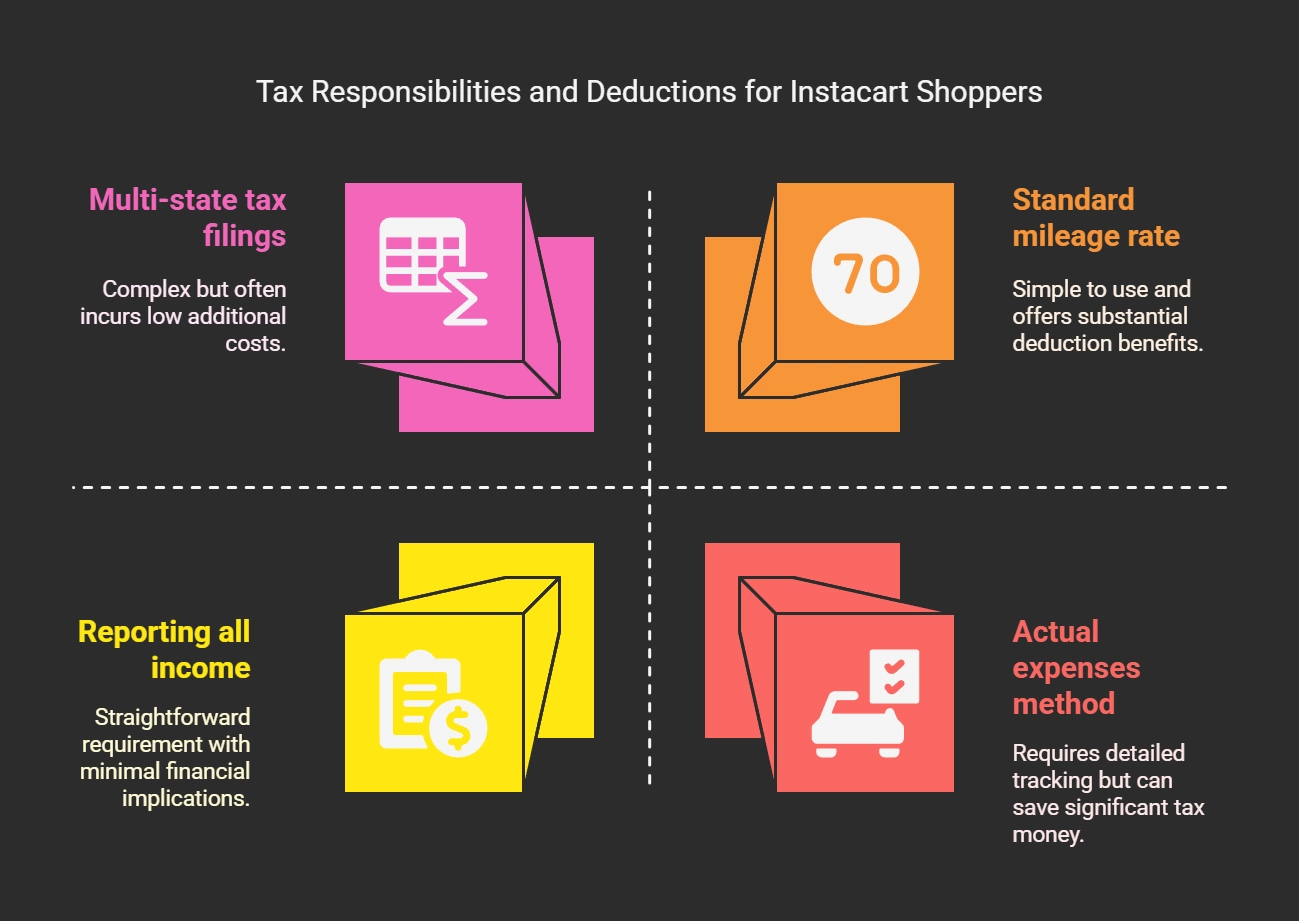Last updated: March 17, 2025
In the evolving landscape of modern work, the concept of a “tax home” has become increasingly relevant, particularly for those venturing into the realm of home-based businesses. Understanding the home-based business concept goes beyond its simple definition; it’s about grasping the full scope of what it means to operate a business from the comfort of one’s own home.
The home-based business definition underscores a shift towards more flexible, accessible, and often digitally-driven business models. This shift opens a plethora of home-based business opportunities, offering entrepreneurs the chance to embark on ventures that were once thought to be the domain of traditional office settings.

Understanding the Tax-Home Concept: Basics for Home-Based Entrepreneurs
Embarking on the journey of home-based entrepreneurship brings with it a unique set of opportunities and challenges, particularly when it comes to taxes. The concept of a “tax home” is pivotal for those navigating this path, as it lays the foundation for many tax deductions and benefits you can claim. Let’s dive into what this means for you, the ambitious home-based entrepreneur, and how you can leverage this knowledge to your advantage.
What is a Tax Home? In essence, your tax home is the primary place of your business, employment, or work. For home-based business owners, this generally means that your office, even if it’s in a corner of your living room, qualifies as your tax home. This designation is crucial for determining travel expenses, home office deductions, and more.
Key Takeaways for Home-Based Business Owners:
- Deduction Eligibility: Expenses directly related to your home office can often be deducted, potentially lowering your taxable income. This includes a portion of utilities, rent, or mortgage interest, and even some home maintenance costs.
- Home Office Requirements: To claim a deduction for a home office, the space must be used regularly and exclusively for business. This means your home office should be a distinct area dedicated to your business activities.
- Indirect vs. Direct Expenses: Understand the difference between direct expenses (those directly related to your home office) and indirect expenses (costs that benefit your entire home, like heating and electricity). Both can be partially deductible.
FAQs for Navigating Your Tax Home
- Q: What is a home-based business?
A: A home-based business refers to an enterprise operated primarily from the comfort of one’s own home. This type of business model is increasingly popular due to its flexibility, reduced overhead costs, and the convenience it offers.
- Q: Can I claim the home office deduction if I work from different parts of my house?
- A: The IRS specifies that the area used for business must be used regularly and exclusively for that purpose. Working from the kitchen table does not qualify. However, if you have a designated space that meets these criteria, you can claim it.
- Q: How do I calculate the deduction for my home office?
- A: There are two methods: the simplified option (a standard deduction of $5 per square foot of home used for business, up to 300 square feet) and the regular method (based on the percentage of your home devoted to business use).
- Q: Are there any deductions I might be overlooking as a home-based business owner?
- A: Yes! Many home-based entrepreneurs overlook deductions for office supplies, business-related subscriptions, and even certain types of software. Also, if you entertain clients at home, a portion of these expenses may be deductible.
- Q: What records should I keep to support my deductions?
- A: Maintain detailed records of expenses, receipts, and use of your home office space. This includes utility bills, mortgage statements, and any receipts for office supplies or maintenance.
Eligible Deductions for Your Home Office: What You Can and Can’t Claim
When you transform a corner of your home into a bustling hub of business activity, not only do you save on commuting time, but you also unlock a treasure trove of potential tax deductions. Understanding what you can and can’t claim for your home office is like finding a map to this treasure. Let’s embark on this exploratory journey to ensure you’re claiming every gold coin you’re entitled to, without attracting the unwanted attention of the tax authorities.
The Treasure Chest: Deductible Home Office Expenses
- Direct Expenses: These are costs solely for your home office. Think of it as the treasure you don’t have to share with the rest of the house—like painting your office walls or repairing the office window.
- Indirect Expenses: These are the costs of running your entire home, which are shared treasures. You can claim a portion of these expenses, such as utilities, internet, mortgage interest, and insurance. The amount you can claim depends on the size of your office as a percentage of your home.
- Depreciation: If you own your home, you can also claim depreciation for the portion of your home used as an office. This is like the value of the treasure decreasing over time because of its use in your business.
Beware of the Traps: Non-Deductible Expenses
- Home Renovation: General home improvements are not directly deductible unless they are specific to the home office area.
- Property Taxes and Homeowner’s Insurance: While these are partially deductible under indirect expenses, the rules can be complex, so proceed with caution.
FAQs for Claiming Your Home Office Deductions
- Q: What if I use a part of my room as an office, but it’s not separated by a wall?
- A: The IRS requires the space to be regularly and exclusively used for business. A partition can help, but it’s not necessary if you can clearly delineate a specific area exclusively for work.
- Q: Can I deduct my entire internet and phone bill?
- A: You can partially deduct internet from your taxes and phone bill that is used for business. If you have a separate phone line or internet connection for your business, the entire cost is deductible.
- Q: What about office supplies and equipment?
- A: Yes, office supplies and equipment used for your business are fully deductible. This includes computers, printers, and software, provided they are used for business purposes.
- Q: How do I calculate the portion of my mortgage or rent that is deductible?
- A: Calculate the percentage of your home’s total square footage that your office occupies. Then, apply this percentage to your mortgage or rent to determine the deductible amount.
Maximizing Home Office Deductions: A Step-by-Step Guide
Diving into the world of home office deductions can feel like navigating a labyrinth. But fear not, intrepid home-based business owner! With the right map and compass, you’ll find there’s a treasure trove of savings to be uncovered. Let’s break down the step-by-step guide to maximizing your home office deductions, making sure you don’t leave any money on the table.
- Step 1: Determine Your Eligible Space First up, identify the area of your home used exclusively and regularly for business. This could be a whole room or just a part of one. Measure this area to know exactly how much space your home office occupies.
- Step 2: Choose Your Deduction Method There are two paths you can take: the simplified option or the regular method. The simplified option offers a straightforward calculation ($5 per square foot of office space, up to 300 square feet), while the regular method requires calculating the percentage of your home used for business and applying that to your home expenses.
- Step 3: Calculate Your Expenses Gather all your home-related bills — mortgage interest or rent, utilities, insurance, repairs, and so on. If you’re using the regular method, you’ll need these to work out what percentage of these costs applies to your home office.
- Step 4: Fill Out the Form Whether you’re a sole proprietor, partner, or corporation, there’s a form for you. Form 8829 is commonly used for sole proprietors to calculate and claim the deduction.
- Step 5: Keep Good Records Document everything. Keep all receipts, bills, and calculations related to your home office. These records are essential in case of an audit.
FAQs to Guide You Through
- Q: What if I use a corner of my living room as an office? Can I still claim a deduction?
- A: Yes, but the key is that the area must be used regularly and exclusively for business. If your living room office meets these criteria, measure your workspace and calculate your deduction accordingly.
- Q: How do I decide which deduction method to use?
- A: The simplified method is great for its ease, but it may not offer you the biggest deduction if you have significant home office expenses. If your actual expenses are high, taking the time to use the regular method could be more beneficial.
- Q: Can I switch between methods from year to year?
- A: Absolutely! You’re free to choose the method that works best for you each tax year. Just remember, once you’ve filed your return, you can’t change the method for that year.
- Q: What about renovations or improvements to my home office?
- A: Improvements are a bit different from regular expenses. They’re considered capital expenses and are depreciated over time. You can still deduct these costs, but the process is more complex than for annual expenses.
Record-Keeping and Documentation: Best Practices for Home-Based Business Taxes
Welcome to the cornerstone of savvy financial management for home-based businesses: record-keeping and documentation. Think of it as your business’s safety net, ensuring that if the taxman cometh, you’re ready and waiting with a well-organized treasure trove of documents. Let’s dive into the art of keeping your financial ducks in a row, making tax time a breeze rather than a blizzard.
The Essentials of Record-Keeping
Record-keeping is not just about hoarding every slip of paper; it’s about organizing them in a way that would make Marie Kondo proud. Here’s a starter kit for your financial organization:
- Receipts: Every business expense, no matter how small, deserves its place in your records. From that new ergonomic chair to the ink for your printer, keep those receipts.
- Bills and Statements: This includes utility bills, internet, rent, mortgage interest, and any other home office-related expenses. If it costs money to run your business, it counts.
- Bank and Credit Card Statements: These are crucial for corroborating the expenses and income you report. Plus, they’re a gold mine for spotting deductions you might have missed.
- Mileage Logs: If you use your vehicle for business, keeping a detailed log of your mileage for business trips is a must for deducting vehicle expenses.
- Invoices and Sales Receipts: These validate your income, so keep them organized and readily accessible.
FAQs to Keep Your Records Straight
- Q: How long should I keep my business records?
- A: The IRS recommends keeping records for at least three years from the date you file your tax return. If you claim a loss for worthless securities or bad debt deduction, keep records for seven years.
- Q: Can I keep digital records, or do I need to keep all physical receipts?
- A: Digital records are perfectly acceptable and can be a lifesaver in terms of space and organization. Just make sure your digital copies are clear and legible. Use a scanner or a document scanning app to keep digital versions of your receipts and documents.
- Q: What if I work from home part-time? How do I document that for deductions?
- A: Document the hours you work at home versus any other location. Keep a detailed log or calendar entries of your work schedule to substantiate the percentage of home office use for business.
- Q: I made some purchases that were partly for personal use and partly for business. How do I handle this?
- A: Allocate the expense between personal and business use based on a reasonable method. For instance, if you use your internet 50% for business and 50% for personal use, only 50% of the cost is deductible. Document your methodology and keep it with your records.

Leveraging MileageWise for Optimal Home-Based Business Mileage Deductions
When it comes to maximizing deductions for your home-based business, tracking every mile traveled for business purposes is essential. This is where MileageWise, a comprehensive mileage tracking and logging solution, comes into play. Designed to streamline the often tedious process of mileage documentation, MileageWise offers a suite of features that can significantly benefit home-based entrepreneurs.
Key Benefits of Using MileageWise
- Accurate Mileage Tracking: Forget about the guesswork or hastily scribbled notes in your planner. MileageWise uses advanced technology to accurately track every business-related trip, ensuring that you’re capturing every deductible mile.
- IRS-Compliant Reports: One of the standout features of MileageWise is its ability to generate detailed, IRS-Proof reports. This not only simplifies your tax preparation process but also provides peace of mind knowing that your mileage logs meet all necessary legal requirements.
- Retrospective Mileage Logging: Missed tracking some trips? MileageWise offers a couple of mileage logging features, namely the AI Wizard and the Google Timeline Importer, allowing you to recreate your travel logs accurately. This is particularly useful for home-based business owners who may not remember to log every trip as it happens.
- Integration with Freshbooks: If you use the popular software, you can import your mileage logs straight into your Freshbooks account for further processing. MileageWise also offers a vehicle expense tracker.
- Customizable Settings for Home-Based Businesses: Recognizing the unique needs of home-based entrepreneurs, MileageWise allows for customizable settings that reflect the nature of your business travels. Whether it’s trips to meet clients, purchase supplies, or other business errands, MileageWise adapts to your specific situation.
Download MileageWise’s automatic mileage tracker app from Google Play or the App Store & try it for free for 14 days. No credit card required!
FAQs
- Q: How does MileageWise ensure accuracy in mileage tracking?
- A: MileageWise uses GPS technology along with manual entry options to ensure every trip is accurately logged. Users can review and edit logs to ensure precision.
- Q: Can MileageWise help if I’ve forgotten to log trips throughout the year?
- A: Yes! The retrospective mileage logging feature mentioned above allows you to go back and fill in missing trips based on your calendar, receipts, and other business records.
- Q: Is it complicated to generate IRS-compliant reports with MileageWise?
- A: Not at all. MileageWise is designed with ease of use in mind. With a few clicks, you can generate detailed reports that comply with IRS requirements, making tax time much less stressful.
Wrapping Up
Navigating the intricacies of running a home-based business requires a keen understanding of the tax home concept, meticulous record-keeping, and a proactive approach to leveraging business deductions.
Through detailed exploration of home office deductions, the significance of maintaining comprehensive documentation, and the innovative solutions offered by tools like MileageWise, entrepreneurs can confidently maximize their financial benefits.
Embracing these strategies not only ensures compliance with tax regulations but also enhances the overall efficiency and profitability of your home-based business.
As you journey through the entrepreneurial landscape, remember that the key to success lies in staying informed, organized, and adaptable to changes. With these practices in place, you’re well-equipped to navigate the challenges and opportunities of home-based entrepreneurship, transforming your business vision into a thriving reality.
Download MileageWise’s automatic mileage tracker app from Google Play or the App Store & try it for free for 14 days. No credit card required!








